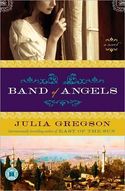
 I’ve always loved a bolter–Nancy Mitford’s perfect description of women who make a dash for it. But strangely enough, until I was asked to write this blog, it had not occurred to me that all of my heroines are, without exception, bolters, or traveling women–either in the direction of a new job, or a new life, a new country or some unsuitable adventure in a stranger’s arms.
I’ve always loved a bolter–Nancy Mitford’s perfect description of women who make a dash for it. But strangely enough, until I was asked to write this blog, it had not occurred to me that all of my heroines are, without exception, bolters, or traveling women–either in the direction of a new job, or a new life, a new country or some unsuitable adventure in a stranger’s arms.
The reasons why I am drawn to such women wouldn’t take long on the analyst’s couch. I was an air force brat.
When I was a child, I changed friends, schools, houses, and often countries every two and a half years. As children do, I accepted this as normal, and if I was emotionally scarred by it, I’m not aware of it, but what it does mean is that certain restlessness is bred in the bone.
Which is why I love writing historical fiction: it gives me a perfect grown up excuse to scratch that itch periodically –roughly every two years come to think of it.
My first book, THE WATER HORSE, published in the U.S. under the title: BAND OF ANGELS, is a fictionalized account of the life of a woman called Jane Evans. She lived in a tiny town in Wales called Pumpsaint and, in 1853, ran away from home with some Welsh cattle drovers in order to join Florence Nightingale and her nurses in Scutari.
When I first found Jane Evans–on a small plaque outside a windswept church in Pumpsaint–I felt a tingling in my scalp. I’d found my book and it was a traveling book!
At first I planned a biography, but quickly realized that as most of the nurses were illiterate, that would be next to impossible. This led to what felt like my own leap into the unknown–a novel.
The first part of this journey involved a horse. In Wales, where I live, the mountains and valleys are criss–crossed by wide green grassy tracks which were once the only way to transport, cattle, sheep and even geese (with their feet tarred and shod) to the meat markets of England. Outside our farmhouse, at the end of our path, there are the two huge pine trees that used to signal to drovers that they and their animals were welcome to stay here for the night.
I rode with an amateur historian and passionate horsewoman, Daphne Tilley, who leant me her own retired show jumper, Fred. I wanted to imagine what it would feel like to be Jane Evans and ride for miles and miles across Wales.
It was one of the best weeks of my life. It was tiring, yes, occasionally scary–at one point, crossing the Snowdon Mountains, Fred and I nearly fell off the side of a cliff when an electrical cable collapsed onto him and scared him half to death. But mostly it was heaven–perfect summer weather, agreeable companions, picnics in the wild with horses cropping grass nearby, and constant changes of scenery: wild mountains, green tracks, the sea.
There is something incredibly soothing too about the rocking rhythm of a horse, which takes you out of ordinary time, gives you space to dream and think.
The next trip for the same book was to Istanbul, this time with my 81-year-old mother, another one with itchy feet. There, we took a ferry across the Bosporus, to explore the gaunt looking naval barracks that was once the hospital where Florence Nightingale and her nurses lived.
An armed guard agreed to take me up to what was once Nightingale’s bedroom. This room with its green velvet chaise longue, its desk neatly arranged with bottle of ink, note book, dip pens, felt almost spookily alive for me–she might almost have nipped out in a hurry to supervise the making of beef jelly, or some fortifying tea.
That night, to check out another scene in the book, my mother and I left our modest hotel for drinks at what was once considered the poshest hotel in Istanbul – The Pera Palace.
This was the hotel where passengers off the Orient Express used to sip champagne, where Mata Hari and Rita Hayworth stayed, and where Agatha Christie went to lick her wounds after hearing of her husband’s infidelity. For reasons I can’t remember now, we ended up at a Turkish wedding in the main ballroom, where there was a riotous band and we were taught to dance Turkish style and drank raki the local tipple.
My second book, EAST OF THE SUN, was another good excuse for bolting, now officially called research. This time my husband and I went north to Rajasthan, where we took the tiny little Noddy and Big Ears train up the foothills of the Himalayas to Simla. The second time, I went on my own to Mumbai (Bombay), and then to an ashram near Poona. In Poona, I went to see the hospital where my husband was born. (His father was in the Indian cavalry).
In Delhi, I explored the old cantonments where the British lived; I went to a shabby shop to talk to a beaming old man called Tailor Ram. When I asked him if he remembered his British clients, he produced for me in a cloud of cloud of dust an old pattern book full of measurements and orders for jodhpurs and shark skin dinner jackets, and morning suits, made for the British Sahibs. These are the moments that give you the kind of tingle you’ll never get in a library. You have to go, or at least I do–the travel is the treat, the carrot and the perfect excuse for catching a bolting heroine.
Julia Gregson’s BAND OF ANGELS (Touchstone / Simon & Schuster) is available wherever books are sold Learn more


No Comments
Comments are closed.